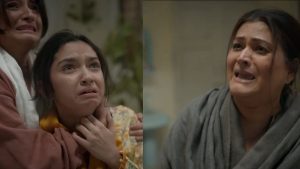We belong in a deeply patriarchal society where women aren’t picked for marriages in terms of how good of a companion they can be to a man, but how they can offer unpaid labor for the entire family. Within the media, there are more stories plagued with toxic tropes like the scheming, manipulative bahu, one that marries for money and plots to remove the mother and sister’s presence once she marries the man. Or the wife who begins an affair with another man behind her husband’s man, which hardly represents the reality about how toxic marriage households have become for Pakistani women Even the more progressive dramas aren’t devoid of such plotlines, like in ‘Dobaara’, where the scheming new wife and her mother plot together to turn her husband against his mother simply for wearing jeans around the house.
Such woman-hating content that seeks to further push the misogynist notion that ‘aurat hi aurat ki sab say bari dushman hoti hai’ fails to give a chance for women to reveal the truth about how in reality, more marriages in Pakistan demand women to give up their independence and freedom. It was the Soul Sisters Founder, Kanwal Ahmed, who debunked this stereotype on Twitter, by pointing out that in reality more women in Pakistani marriages are treated as bonded slaves, unable to visit their homes after their marriage and even to the extent of being called “un-grateful” or “lazy” for neglecting their duties to their homes.
In a Twitter thread, Kanwal revealed the multiple techniques employed by the husband and his family members to keep the wife from seeing her family:
‘Men & in-laws not letting their wives see their parents is not a myth. It’s a REAL problem. Multiple techniques are used:
1. Forcefully – “learn to live in susral. This is your home now.”
2. Emotional blackmail – “na jao. I can’t live without you, even for one night.”
3. Loading them with so much work they’re unable to take out time to see their parents – “aray bhai tum chali jao gi toh kaam kaisay hon ge?”
Society continues to shut their eyes to this heartbreaking problem many women face. After all women are just seen as a complainers.’
Men & in-laws not letting their wives see their parents is not a myth. It’s a REAL problem. Multiple techniques are used:
1. Forcefully – “learn to live in susral. This is your home now.”
2. Emotional blackmail – “na jao. I can’t live without you, even for one night.”
(1/2)— Kanwal Ahmed (@kanwalful) July 7, 2022
3. Loading them with so much work they’re unable to take out time to see their parents – “aray bhai tum chali jao gi toh kaam kaisay hon ge?”
Society continues to shut their eyes to this heartbreaking problem many women face. After all women are just seen as a complainers.
— Kanwal Ahmed (@kanwalful) July 7, 2022
In the comment section women shared heartbreaking stories about themselves, or other women they know and how after marriage, they have had to face the sexist belief that “after marriage a woman’s new home is where her husband is now”, and are no longer given permission to visit their parents.
This user shared how a woman she knew was restricted by her in-laws to not spend longer than a night at her parent’s home
Knew a girl that went to the Middle East after getting married. Her parents & in laws both lived in Pindi. When she & her kids visited, she was only allowed to go to her mother’s house for the day, no sleepovers. A grown woman, not allowed to sleep at the house she grew up in.
— Fatima 🧷 (@fatyana) July 7, 2022
The other heartbreaking stories that began pouring out in this thread have proven that there is a recurring pattern in the way marriages function in Pakistan: women are considered as the property of their new families after their marriage. We keep encouraging women to look for husbands as after their marriage, they will be free to spend as much money and go where ever they wish to go. But in reality, marriage is just a woman being transferred from one patriarch to another.
True & fully endorsed as one of my good friends is going through the same experience as her mother is been going through Chemotherapy & she’s the only daughter nearby despite that fact she’s been forced to stay at Susral & not allowed to go & see her Sick mother even for a week. https://t.co/8tpVb1r3q6
— Anjum Amara | انجم عماره (@Bint_e_Sadiq) July 8, 2022
I know few women who are not even allowed to go to their parents when they’re pregnant so they can at least rest in those difficult days but are made to do all the chores at susral in that condition
— noor💕 (@tht_nor) July 7, 2022
Yes same thing is happening to my czn for the past 14 years and she is not even protesting and i know a lot of other similar cases. why are these men hell bent k aisa hora hi nhi. Is se bhi worse krte log aur phir sath kehte k tum humara krti kia ho!
— Samia (@samiabytheway) July 7, 2022










